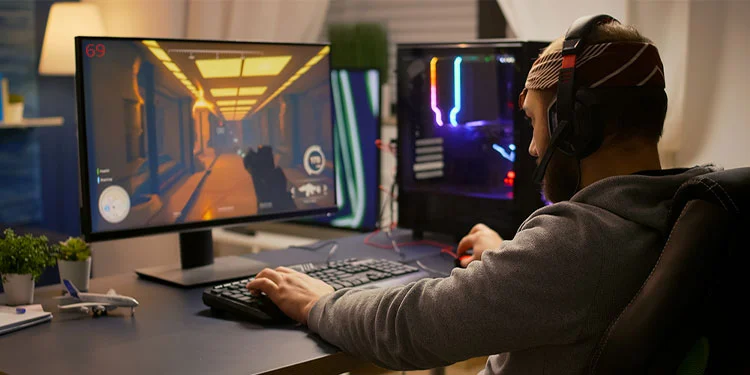Does CPU Affect Fps? – The Honest Information In 2023
Your CPU affects your in-game FPS because it’s highly involved in so many features of game processing. However, certain factors change how applicable the CPU is to your FPS.
Games that rely more on CPU power tend to be less demanding on GPUs, which means that your CPU will significantly impact your FPS in these games.
Additionally, if you’re playing a game on a lower-end GPU, your CPU will play a more prominent role in determining your FPS because the GPU will be the bottleneck. In general, your CPU will always be a factor in your in-game FPS.
How Does Cpu Affect Fps:
The clock speed of a CPU can have a significant impact on in-game FPS. The more cycles per second the CPU has, the more game instructions it can process each second.
This, in turn, can affect in-game FPS because the faster the CPU, the more smoothly the game will run.

Modern midrange and high-end CPUs are all very fast, often boosting up to close to 5GHz while gaming, so they should be able to handle even the most demanding games without any problems.
Which One Affects Fps More, CPU Or GPU?
While your graphics card usually affects FPS more than your CPU, your CPU does affect FPS in many ways.
It gives the GPU environment information for rendering and handles game logic, such as calculations relating to your character’s interactions with other in-game objects or surfaces.
In other words, the CPU is responsible for much behind-the-scenes work that affects your FPS. So while your graphics card is the more critical factor in FPS, your CPU still has a significant impact.
How Does CPU Affect Fps If I Have A Good Graphics Card?
CPUs and GPUs are both important in gaming and achieving high FPS. A sound graphics card will help you render games faster and have better visuals.

Still, a powerful CPU is also necessary to quickly process all of the information.
If you have a sound graphics card but a weak CPU, you may still experience lag or choppiness in your gameplay.
In short, both a good CPU and GPU are necessary for optimal gaming performance.
How Many Fps Do You Need:
For most people, 60 FPS is the best frame rate to play at. This isn’t only because of the images’ smoothness but also because 60Hz monitors are the most readily available ones.
Furthermore, acquiring a GPU that can output 60 FPS in a video game is easy and inexpensive nowadays.
Some gamers argue that higher frame rates are better, but 60 FPS is more than enough for most people.

Higher frame rates can be harder on your graphics card and more expensive. 60 FPS is a great place to start if you’re starting out in gaming.
Does CPU Temperature Affect FPS?
Yes, an overheating CPU or GPU can affect your FPS because they can get thermal throttle, which means using less power to cool themselves off. This will directly lower your FPS as a result.
So if you’re noticing a dip in performance, it may be due to your components overheating.

Make sure to keep an eye on your temperatures and take measures to keep your system cool, such as using other fans or liquid cooling.
What Is The Significance Of A High Fps In Gaming?
At least, you need 24 FPS for different frames to appear as one moving image.FPS, or frames per second, measures how well a game can keep up with the action.
The higher the FPS, the smoother the game will run. A high FPS is especially important in first-person shooters and other fast-paced games, where a split-second can mean the difference between life and death.
A high FPS can also be helpful in more slow-paced games, making the action appear more fluid and realistic. Ultimately, whether or not to prioritize FPS will come down to personal preference.
How Much Does CPU Affect Fps?
The CPU clock speed can affect in-game FPS because the more cycles were per-second, the more game instructions it can process each second.
Modern midrange and high-end CPUs are very fast, often up to close to 5GHz while gaming.

However, even a slight increase in clock speed can make a big difference in FPS. So, upgrading your CPU is an excellent place to start if you want to improve your gaming performance.
Does Overheating CPU Affect Fps In Games?
Overheating can affect FPS in games. If your CPU is overheating, it will throttle itself to try and stay within safe temperatures, which can result in lower FPS.
In extreme cases, overheating can even damage your CPU, leading to lower FPS or a complete crash. To avoid these issues, it’s essential to keep your CPU cool.
Does Upgrading CPU Improve FPS?
It depends on how much your GPU is being used. If your GPU usage is around 80-90%, upgrading your CPU will increase your frame rate, but not by much.
However, if your GPU usage is only 50%, upgrading to a better CPU could double your frame rate.
Therefore, it is essential to consider how much your GPU is used when deciding whether or not to upgrade your CPU.
Upgrading your CPU can improve your FPS in some games, but other guarantees exist. Consider other factors if you’re looking to upgrade your CPU to increase your FPS.
For example, your graphics card, monitor, and in-game settings can all affect your FPS. If you’re looking to upgrade your PC for gaming, it’s best to consult a professional to get the most bang for your buck.
Conclusion:
Your CPU will always affect your in-game FPS because, as described above, it’s heavily involved in many aspects of game processing.
However, certain factors change how relevant the CPU is to your FPS. For one, while most games are GPU intensive, some are CPU intensive.
Games that require a lot of processing power for AI or physics tend to be more CPU-intensive, while games that rely heavily on graphics tend to be more GPU-intensive.
The quality of your CPU is the other factor that affects how much your CPU affects your FPS. A higher-quality CPU will be able to handle more processing power, which means it will be able to provide a better gaming experience.
Related Posts:






